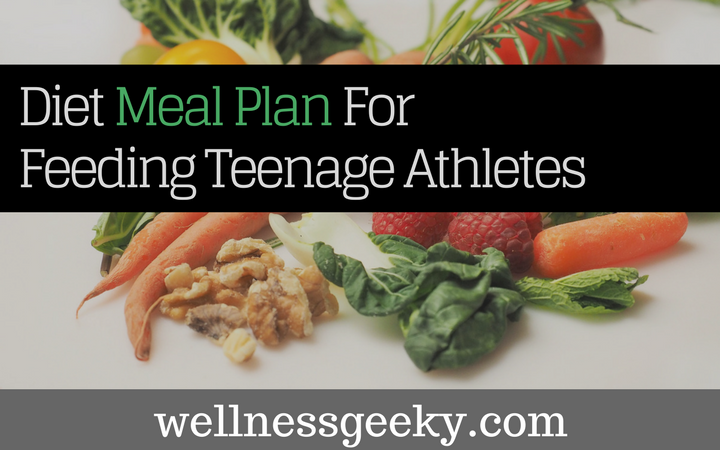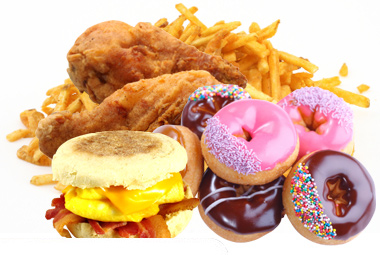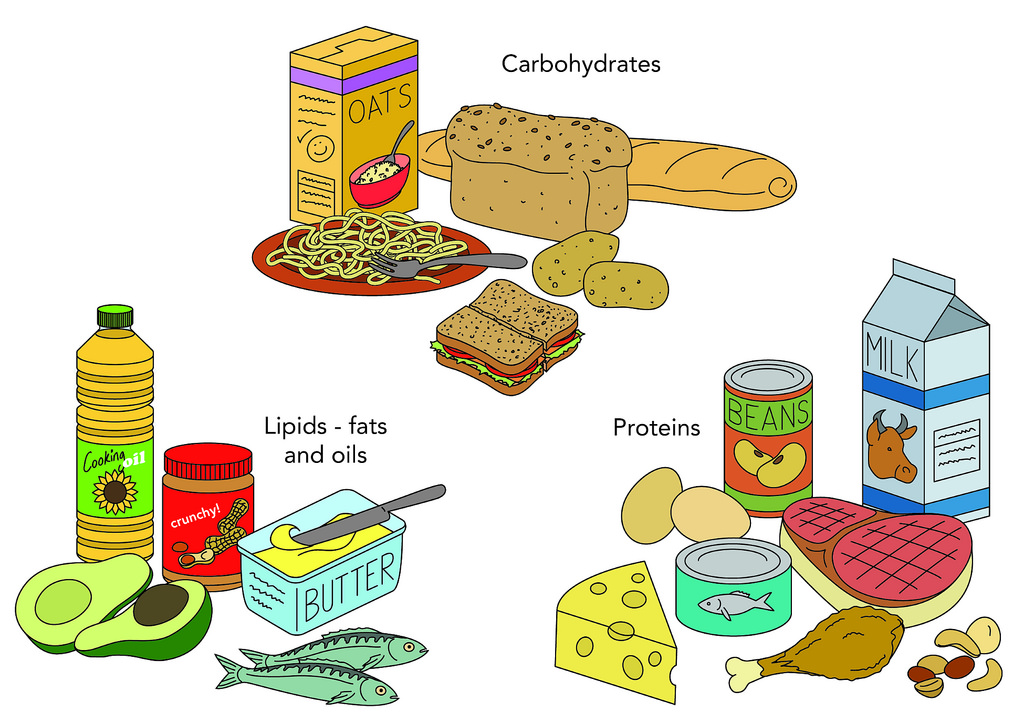
It is essential for you, as a parent, to ensure that your teenage athlete gets the necessary nutrients and vitamins to perform at the optimum level.
Would you put cheap gas in an expensive automobile?
Of course not!
Similarly, why would you put added sugars and unhealthy fats in your teenage athlete´s body?
On average, male teenage athletes require at least 3,000 to 4,000 calories a day. On the other hand, female teenage athletes can perform well with 2,200 to 3,000 calories a day.
When focusing on creating a nutrition and diet meal plan for your young one, you should include fruits, whole-grain bread and cereals, vegetables, low-fat dairy, lean protein, and heart-healthy fats in his/her diet.
Vitamins for girls can also be of significant help to metabolize nutrients in carbohydrates and fats.
However, you should mainly ensure that your teen receives enough carbs and proteins.
Carbohydrates are, by far, the most important fuel for an athlete. Carbs are stored as fuel inside muscles and athletes require carbs both before and after an activity.
Carbs are the only fuel that is used for power moves such as a slam dunk, a dash to the goal line, a quick sprint, and whatnot.
It is also of paramount importance for your teenage athlete to consume foods rich in proteins. After all, proteins help build muscle.
Your teenage athlete should ditch expensive protein supplements and instead focus on eating only real food such as chicken, turkey, fish, lean meat, low-fat milk, beans, lentils, tofu, cheese, yogurt, etc.
What Should You Eat Before an Athletic Event?
A teen should basically eat a pre-competition meal prior to an athletic event.
A pre-competition meal is essentially a meal that provides the nutrients, calories, and liquids your teen requires to compete in an athletic event.
The meal should not only curb hunger, but it should also help one avoid dehydration. It is ill-advised for an athlete to eat foods that he/she usually doesn´t eat before an event.
That´s because new foods can play an atrocious role in causing stomach problems including stomach cramps and diarrhea. As we mentioned earlier, it is essential for an athlete to include carbohydrates and fluids in his/her diet before an athletic event.
A young athlete's diet should comprise foods rich in carbohydrates such as rice, pasta, bread, potatoes, vegetables, etc.
While preparing a pre-competition meal, you should avoid including foods that are high in fat or protein. Foods rich in fat or protein take longer to digest than carbohydrates.
When is the Right Time for Your Teen Athlete to Eat a Pre-Competition Meal?
It is suggested for your teen athlete to eat a pre-competition meal at least 3 to 4 hours before an event.
Doing so gives the body enough time to digest the food. If it is impossible to eat a meal 3 to 4 hours before the event, your teen athlete should eat a snack or a light meal.
Basically, it takes around 3 to 4 hours for the body to digest a large meal. However, the body is capable of digesting a small meal in less than 2 to 3 hours. A light snack can be digested in an hour.
You can also follow the sample game day nutrition plan mentioned below;
Pre-game Breakfast
The pre-game breakfast must be consumed 3-4 hours before the main event. You can serve food such as potatoes, eggs, berries, oranges, fat-free milk, etc., to your teenage athlete.
Don't Skip Lunch
If your teenage athlete´s event is after school, it is essential for him/her not to skip lunch. Lunch should be hearty and represent as many food groups as possible including whole grains, lean protein, vegetables, fruit, and low-fat dairy.
During the Game/Practice
It is of paramount importance for your teenage athlete to be hydrated at all times. Therefore, he/she should be hydrated before, during, and after practices and events. It is essential to replace the fluid lost through sweating.
Your teenager can also snack on foods such as potatoes, bananas, fat-free or low-fat yogurt or milk, sports nutrition bars, etc., during the sessions. Foods rich in carbohydrates and potassium are necessary to help replenish your teenager after exercise.
Post-Practice Snack
There may be a need for your teenager to have some snacks before the family dinner. Therefore, you must ensure that you have snacks prepared for your kids when they arrive home hungry after a tough practice session. Snacks can include low-fat yogurt, fresh fruit, and smoothies.
Post-Game Dinner
You should attempt to include foods that are rich in protein, vegetables, fruit, dairy, and grains for the post-game dinner. You can serve foods such as chicken breast, tuna, salmon, whole grains, salad, apples, pears, milk, etc.
What Foods or Drinks Should Your Teen Athlete Avoid Completely?
You are what you eat. Therefore, it is necessary for anyone to pay attention to what they eat.

Your teen athlete should completely avoid high-fat foods such as French fries, sausages, candy bars, potato chips, and doughnuts.
The aforementioned foods are not only difficult to digest, but they can also cause stomach discomfort too.
In addition to that, they won´t be able to provide enough energy during an event.
A teen athlete should also avoid drinking carbonated beverages such as soda. It is also recommended for athletes to avoid high-fiber foods because they are capable of causing stomach discomfort and gas during events.
It is also necessary for you to not force your teen athlete to eat before events.
Not all athletes can consume the food before events, despite their best intentions. Some may even suffer from an upset stomach if they eat before an event.
If your child belongs to this category, you should ensure that he/she eats very well the day before or early on the big day if possible i.e., if the event is later on in the day.
Frequently Asked Questions
What is the Recommended Level of Dietary Protein for Adolescent Athletes?
The recommended level of dietary protein for adolescent athletes is a crucial factor in supporting their growth, development, and athletic performance. Adolescents engaged in sports require an adequate intake of protein to meet the increased demands on their bodies due to physical activity and the growth spurt associated with puberty.
Scientific consensus suggests that adolescent athletes should aim for a protein intake within the range of 1.2 to 2.0 grams per kilogram of body weight per day. This range takes into account the diverse needs of athletes based on factors such as the intensity and type of sport, individual growth rates, and training duration. Higher protein needs are often associated with sports that involve strength training and muscle development.
Protein plays a fundamental role in muscle protein synthesis, repair, and recovery. For adolescent athletes, whose bodies are still developing, an adequate protein intake is essential for the formation and repair of tissues, including muscles and bones. It also supports the synthesis of enzymes and hormones involved in various physiological processes related to physical activity.
It is important for adolescent athletes to distribute their protein intake evenly throughout the day, including protein-rich sources in each meal and snack. Common sources of dietary protein include lean meats, poultry, fish, eggs, dairy products, legumes, and plant-based alternatives. While meeting protein requirements is vital, it is equally important for adolescent athletes to maintain a balanced diet that includes carbohydrates, fats, vitamins, and minerals to support overall health and energy needs.
In summary, the recommended level of dietary protein for adolescent athletes ranges from 1.2 to 2.0 grams per kilogram of body weight per day. Achieving this protein intake is essential for supporting growth, muscle development, and overall athletic performance during this critical period of physical development. Individualized nutrition plans, taking into account the specific demands of the sport and the athlete's growth trajectory, are recommended for optimal results.
